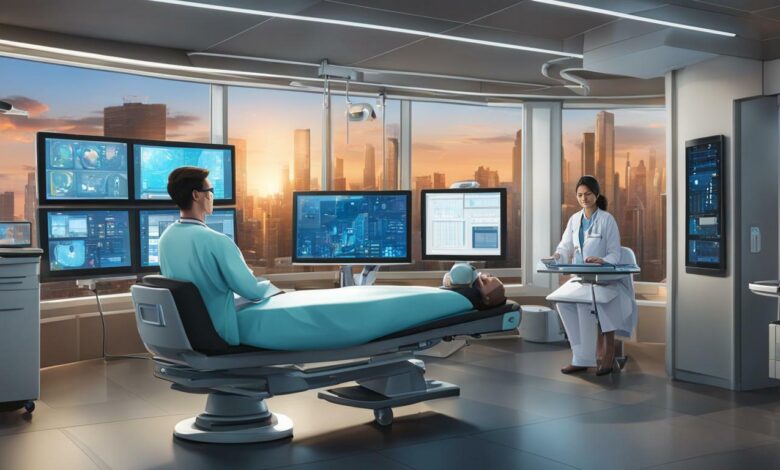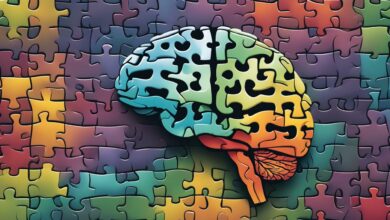The Impact of Technology on Healthcare

Healthcare technology has been revolutionizing the US medical scene, leading to transformative impacts on patient care and services. From telemedicine to health monitoring apps, technology has significantly impacted healthcare delivery, improving efficiency, accuracy, and accessibility of medical services. In this section, we will explore the significant role of technology in modern healthcare, including the benefits of telemedicine, health monitoring apps and wearables, as well as the future of healthcare technology and its potential implications.
Key Takeaways
- Healthcare technology is revolutionizing the US medical scene.
- Technology is leading to transformative impacts on patient care and services.
- Telemedicine, health monitoring apps and wearables are improving healthcare delivery.
- The future of healthcare technology has the potential to revolutionize healthcare delivery.
- Improved efficiency, accuracy, and accessibility of medical services are the key benefits of healthcare technology.
The Role of Technology in Modern Healthcare
In modern healthcare, technology plays a crucial role as it enables healthcare providers to offer efficient, accurate, and accessible medical services. There are various technological advancements in the healthcare industry today that contribute to the improvement of patient care and services.
One of the most significant impacts of technology on healthcare is the use of electronic medical records (EMRs). EMRs are digital versions of paper charts that contain patients’ medical histories and other essential information. They facilitate easy access to patient information and enable healthcare providers to make informed decisions regarding patient care.
Another innovation that improves the efficiency of healthcare delivery is automated billing systems. These systems automate the billing process, reducing the risk of errors and improving the accuracy of financial records.
Technology also enables remote healthcare consultations through telemedicine, which improves access to healthcare, reduces wait times, and enhances patient convenience. Patients can consult with healthcare providers remotely using a variety of devices, including smartphones, tablets, and computers.
The Impact of Wearables and Health Monitoring Apps
Wearable devices and health monitoring apps are increasingly popular as they enable individuals to track and manage their health conditions, leading to proactive and personalized healthcare. Wearables such as smartwatches and fitness trackers can track physical activity, heart rate, and sleep patterns, providing healthcare providers with valuable information to support their treatment plans.
Health monitoring apps allow patients to track their vital signs, monitor medications, and receive reminders, all of which contribute to better self-care and disease management.
The use of artificial intelligence (AI) in healthcare is also rapidly advancing, with the development of AI-powered diagnostic tools, predictive analytics, and precision medicine. These tools have the potential to revolutionize healthcare delivery and improve patient outcomes.
In conclusion, technology has transformed modern healthcare and has greatly improved patient care and services. With the continued innovation and integration of technology into healthcare delivery, we can expect to see more exciting developments that will positively impact the industry and enhance patient outcomes.
The Benefits of Telemedicine
In today’s fast-paced world, telemedicine has emerged as a game-changer in the healthcare industry. By utilizing technology, telemedicine offers various benefits that enhance patient care, accessibility, and convenience. Let us explore some of the benefits of telemedicine:
Increased Access to Healthcare
Telemedicine enables patients to access healthcare services from the comfort of their homes. This is especially beneficial for those residing in rural or remote areas, where it may be difficult to access medical facilities. Through telemedicine, patients can connect with healthcare providers remotely, regardless of their location.
Reduced Wait Times
One of the most significant benefits of telemedicine is the reduction in wait times for patients. With telemedicine, patients can connect with healthcare providers instantly, eliminating the need to wait for appointments. This is especially useful for patients with urgent medical needs.
Enhanced Convenience
Telemedicine allows patients to attend medical consultations without having to leave their homes. This is particularly useful for patients with disabilities, mobility issues, or those with demanding work schedules. Telemedicine appointments can be scheduled at a time that is convenient for the patient, eliminating the need for them to take time off work or travel to medical facilities.
Improved Healthcare Outcomes
Telemedicine has been shown to improve healthcare outcomes by enabling early diagnosis, proactive healthcare management, and effective treatment planning. With telemedicine, patients have increased access to healthcare services, which allows healthcare providers to monitor their conditions more closely, leading to better health outcomes.
Overall, telemedicine is revolutionizing the healthcare industry by improving access to healthcare services, reducing wait times, enhancing convenience, and improving healthcare outcomes for patients. As the technology continues to advance, it is clear that telemedicine will play an increasingly critical role in the future of healthcare.
Health Monitoring Apps and Wearables
Health monitoring apps and wearables have become increasingly popular among individuals seeking to take control of their health. These technologies allow for the easy tracking and management of various health metrics, from daily step counts to heart rate and blood pressure levels.
One of the primary benefits of health monitoring apps and wearables is their ability to provide individuals with personalized and proactive healthcare. By tracking their health metrics regularly, users can identify potential health issues early on and take preventative measures to address them. This not only improves their overall health outcomes but also reduces healthcare costs in the long run.
Another advantage of these technologies is their convenience. Health monitoring apps and wearables allow individuals to track their health metrics on the go, without the need for traditional healthcare appointments and consultations. This can be particularly useful for those living in remote or underserved areas, where access to healthcare may be limited.
Health monitoring apps and wearables can also be integrated with other healthcare technologies, such as telemedicine services, to enhance the quality and accessibility of care. For example, a patient with a chronic health condition can use a health monitoring app to track their symptoms and share the data with their healthcare provider during a telemedicine consultation. This enables the provider to offer personalized treatment recommendations without the need for an in-person visit.
However, despite the numerous benefits of health monitoring apps and wearables, there are still some challenges that must be addressed. One of the primary concerns is ensuring the accuracy and reliability of the data collected by these devices. This is especially important since such data can directly impact a patient’s treatment plan and outcomes.
Moreover, some individuals may be hesitant to use health monitoring apps and wearables due to concerns around privacy and data security. Healthcare providers and technology companies must work together to address these concerns and ensure that patient data is protected at all times.
In conclusion, health monitoring apps and wearables have the potential to revolutionize healthcare delivery by empowering individuals to take control of their health and enabling remote healthcare consultations. As technology continues to advance, it is likely that these devices will become even more sophisticated, providing individuals with increasingly personalized and proactive healthcare solutions.
The Future of Healthcare Technology
In the ever-evolving landscape of healthcare technology, it is essential to keep a finger on the pulse of emerging trends and their implications. The future of healthcare technology promises even greater advancements, with the potential to revolutionize healthcare delivery and improve patient outcomes.
Artificial Intelligence and Predictive Analytics
One exciting area of development in healthcare technology is artificial intelligence (AI) and its use in predictive analytics. AI-driven algorithms can analyze vast amounts of patient data to identify trends, patterns, and potential health risks. This data can then be used to develop personalized treatment plans, improve disease management, and predict health outcomes with greater accuracy.
Blockchain and Medical Records
Blockchain technology has the potential to transform the way medical records are stored, secured, and shared. By leveraging blockchain’s ability to create a transparent and tamper-proof ledger, patient records can be securely shared across healthcare providers, improving continuity of care and reducing administrative burdens.
Precision Medicine and Genomics
Precision medicine, which seeks to tailor medical treatment to an individual’s unique genetic makeup, is an area of growing interest in healthcare technology. Advances in genomics, bioinformatics, and data analytics are enabling researchers and healthcare providers to develop personalized treatment plans based on a patient’s genetic profile, leading to more effective and targeted care.
Implications for Healthcare Providers
As healthcare technology continues to evolve, there are significant implications for healthcare providers. The adoption of new technologies requires investment in infrastructure, training, and cybersecurity measures. Providers will also need to adapt to new models of care delivery, such as telemedicine and remote patient monitoring, which require a different approach to patient engagement and care coordination.
However, the benefits of embracing healthcare technology are clear. By leveraging these advancements, healthcare providers can improve patient outcomes, enhance operational efficiency, and reduce costs. As such, it is crucial for healthcare providers to stay up-to-date with emerging trends in healthcare technology and be open to incorporating new tools and techniques into their practice.
Enhancing Patient Care Through Technology
Technology has played a significant role in improving patient care in recent years. From electronic medical records to remote patient monitoring, technology has enabled healthcare providers to deliver more personalized and efficient care to their patients.
One way in which technology is enhancing patient care is through the use of electronic medical records (EMRs). By digitizing patient health records, healthcare providers can access critical patient information quickly and easily, leading to more accurate diagnoses and treatment plans. EMRs also facilitate communication between healthcare providers, improving care coordination and reducing the risk of medical errors.
Another innovative application of technology in patient care is remote patient monitoring. With the use of wearable devices and health monitoring apps, patients can track their health conditions and receive real-time feedback on their progress. This proactive approach to healthcare enables patients to manage their conditions more effectively, reducing the need for hospital visits and improving overall quality of life.
Personalized treatment plans are also becoming more common through the use of technology. By leveraging patient data and analytics, healthcare providers can develop treatment plans that are tailored to individual patient needs. This approach to healthcare not only improves patient outcomes but also reduces healthcare costs by eliminating unnecessary treatments.
Overall, technology is transforming patient care by enabling healthcare providers to deliver more personalized, efficient, and effective services. As technology continues to evolve, we can expect to see even greater improvements in patient care and outcomes.
The Impact of Technology on Healthcare
In this section, we will discuss how technology is streamlining healthcare administration processes and leading to transformative impacts on patient care and services. One of the significant ways technology is enhancing healthcare is through its ability to streamline healthcare administration. With the use of electronic health records, automated billing systems, and data analytics, healthcare providers can improve operational efficiency, reduce wait times, and enhance patient outcomes.
Electronic health records (EHRs) allow healthcare providers to access and share patient information quickly, securely, and efficiently. This technology enables healthcare providers to coordinate care across different providers and settings, leading to better healthcare outcomes. Additionally, automated billing systems help reduce administrative burdens and ensure billing accuracy, resulting in fewer billing errors and faster payment processing.
Data analytics is another technology that is transforming healthcare administration. By analyzing patient data, healthcare providers can identify trends, patterns, and opportunities for improvement. This technology helps providers make informed decisions about patient care, leading to better outcomes and lower costs.
Streamlining Healthcare Administration
| Benefits of Streamlining Healthcare Administration | Challenges in Healthcare Administration |
|---|---|
|
|
While technology has the potential to transform healthcare, there are still challenges in adoption. Implementation costs can be high, and healthcare providers may be resistant to change. Interoperability issues can also arise when different healthcare providers use different EHR systems, making it challenging to share patient information.
Despite these challenges, it is clear that technology is playing an increasingly important role in healthcare administration. By streamlining processes, improving efficiency, and enhancing patient care, technology has the potential to revolutionize the healthcare industry.
Ensuring Data Security and Privacy
At a time when healthcare technology is becoming increasingly prevalent, data security and privacy concerns have emerged as significant challenges. With the vast amounts of personal health information being transmitted and stored digitally, it is essential to ensure that adequate security measures are in place to protect patient data from unauthorized access, cyber-attacks, and data breaches.
One of the most critical aspects of healthcare technology is data security. Privacy breaches can have severe consequences, including damage to the reputation of healthcare providers and potential harm to patients. Therefore, it is crucial to ensure that adequate measures are in place to protect sensitive medical information.
Healthcare organizations must comply with various federal regulations, including HIPAA (Health Insurance Portability and Accountability Act). HIPAA mandates strict requirements for the protection of patient data, outlining guidelines for the collection, use, and disclosure of health information.
To ensure data security and privacy, healthcare providers are increasingly adopting encryption technology, which renders data unreadable to anyone without the appropriate decryption key. Additionally, multi-factor authentication provides an extra layer of security, requiring users to provide two or more forms of identification before accessing sensitive data.
Furthermore, healthcare providers are implementing strict access controls, limiting access to sensitive data to only authorized personnel. Regular security audits and risk assessments are conducted to identify and mitigate potential vulnerabilities, preventing unauthorized access and data breaches.
In summary, data security and privacy are critical aspects of healthcare technology that must not be overlooked. As technology continues to play a more significant role in healthcare delivery, it is essential that healthcare organizations adopt robust security measures that ensure compliance with regulations and protect patients’ sensitive medical information.
Overcoming Challenges in Healthcare Technology Adoption
While healthcare technology has the potential to revolutionize the industry, its adoption has been hindered by several challenges. One of the biggest obstacles is cost. Healthcare organizations, especially smaller ones, may not have the financial resources to invest in expensive technologies.
Interoperability is another challenge. Many healthcare systems use different software and technologies that may not be compatible with each other. This can lead to difficulties in data sharing and communication, hampering the effectiveness of digital healthcare technologies.
Resistance to change is also a significant challenge. Healthcare is a highly regulated industry, and adopting new technologies requires significant organizational and cultural changes. Healthcare professionals may be resistant to these changes, preferring familiar, traditional methods of treatment.
However, there are potential solutions to these challenges. For instance, cost can be mitigated through partnerships and collaborations between healthcare organizations and technology companies. Interoperability can be achieved through the development of uniform standards for data exchange and communication. And resistance to change can be addressed through robust education and training programs, highlighting the benefits of digital healthcare technologies.
Addressing these challenges is crucial to maximizing the potential of healthcare technology, improving patient outcomes, and reducing healthcare costs.
Collaborations Between Technology and Healthcare Providers
As we have seen throughout this article, healthcare technology has had a significant impact on the industry, revolutionizing patient care and services. However, the integration of technology into healthcare systems requires collaborations between technology companies and healthcare providers.
These collaborations involve joint initiatives and partnerships aimed at driving innovation and improving patient care. Technology companies bring their expertise in developing and implementing cutting-edge technologies, while healthcare providers bring their knowledge of patient needs and clinical workflows.
One example of this collaboration is the development of electronic health records (EHRs). EHRs enable healthcare providers to access and share patient information seamlessly, improving coordination of care and clinical decision-making. Technology companies have collaborated with healthcare providers to develop user-friendly EHR platforms that meet the unique needs of different healthcare settings.
Another example is the use of telemedicine technologies. Telemedicine allows healthcare providers to deliver care remotely, improving access to healthcare and reducing wait times. Technology companies have collaborated with healthcare providers to develop telemedicine platforms that integrate with existing clinical workflows and enable secure communication between providers and patients.
These collaborations between technology companies and healthcare providers have the potential to drive further innovation and improve healthcare outcomes for patients. By working together, these stakeholders can develop technologies that meet the needs of healthcare providers and patients alike.
Conclusion
In conclusion, we have seen how healthcare technology is revolutionizing the US medical scene, leading to transformative impacts on patient care and services. The role of technology in modern healthcare cannot be overstated, as it improves efficiency, accuracy, and accessibility of medical services.
Telemedicine is one of the most significant advancements in healthcare technology, offering numerous benefits such improving access to healthcare, reducing wait times, and enhancing patient convenience. Additionally, health monitoring apps and wearables have emerged as popular tools for proactive and personalized healthcare.
Looking forward, the future of healthcare technology is exciting, with emerging trends such as artificial intelligence, blockchain, and precision medicine. These technologies have the potential to revolutionize healthcare delivery, improving healthcare outcomes for all.
Furthermore, technology is enhancing patient care in various ways, with innovations such as electronic medical records, remote patient monitoring, and personalized treatment plans. It also streamlines healthcare administration processes, leveraging electronic health records, automated billing systems, and data analytics to improve operational efficiency and reduce administrative burdens.
However, with the adoption of healthcare technology come challenges such as cost, interoperability issues, and resistance to change. Healthcare providers must work to overcome these barriers to leverage the benefits of healthcare technology fully. Collaborations between technology companies and healthcare providers can drive innovation, foster research, and improve patient care through the integration of technology into healthcare systems.
As we move forward, it is evident that healthcare technology will continue to play a crucial role in shaping the industry and improving healthcare outcomes for all. The future is bright, and we must embrace it with open arms.
FAQ
Q: How has healthcare technology revolutionized the US medical scene?
A: Healthcare technology has had a transformative impact on the medical scene in the United States. It has led to significant improvements in patient care and services, enabling more accurate diagnoses, efficient treatments, and enhanced access to healthcare.
Q: What is the role of technology in modern healthcare?
A: Technology plays a vital role in modern healthcare by improving efficiency, accuracy, and accessibility of medical services. It has enabled the development of innovative treatments, advanced diagnostic tools, and effective management systems, leading to better outcomes for patients.
Q: What are the benefits of telemedicine?
A: Telemedicine offers numerous benefits, including improved access to healthcare, reduced wait times for consultations, and enhanced convenience for patients. It allows individuals to receive medical advice remotely, eliminating the need for unnecessary travel and increasing healthcare accessibility.
Q: How do health monitoring apps and wearables contribute to healthcare?
A: Health monitoring apps and wearables empower individuals to track and manage their health conditions proactively. These technologies provide real-time data on vital signs, physical activity, and overall wellness, enabling personalized healthcare interventions and minimizing the risk of complications.
Q: What does the future hold for healthcare technology?
A: The future of healthcare technology is promising, with emerging trends such as artificial intelligence, blockchain, and precision medicine. These advancements have the potential to revolutionize healthcare delivery, improving treatment outcomes, streamlining processes, and enhancing patient experiences.
Q: How does technology enhance patient care?
A: Technology enhances patient care by facilitating the use of electronic medical records, enabling remote patient monitoring, and creating personalized treatment plans. These advancements ensure accurate and efficient healthcare delivery, resulting in improved patient outcomes and satisfaction.
Q: How does technology streamline healthcare administration?
A: Technology streamlines healthcare administration through the use of electronic health records, automated billing systems, and data analytics. These tools improve operational efficiency, reduce administrative burdens, and enable healthcare providers to focus more on patient care.
Q: How is data security and privacy ensured in healthcare technology?
A: Data security and privacy are of utmost importance in healthcare technology. Measures are taken to protect patient information, mitigate cybersecurity risks, and ensure compliance with regulations such as HIPAA. Robust encryption, access controls, and regular audits are implemented to safeguard sensitive data.
Q: What are the challenges in healthcare technology adoption?
A: Challenges in healthcare technology adoption include cost, interoperability issues, and resistance to change. Implementing new technologies requires significant investments and infrastructure updates. Moreover, ensuring compatibility and seamless integration with existing systems can be complex. Overcoming these challenges requires proactive planning and stakeholder engagement.
Q: How do collaborations between technology and healthcare providers benefit the industry?
A: Collaborations between technology companies and healthcare providers drive innovation, foster research, and facilitate the integration of technology into healthcare systems. These partnerships lead to the development of cutting-edge solutions, improved patient care, and the advancement of the healthcare industry as a whole.




